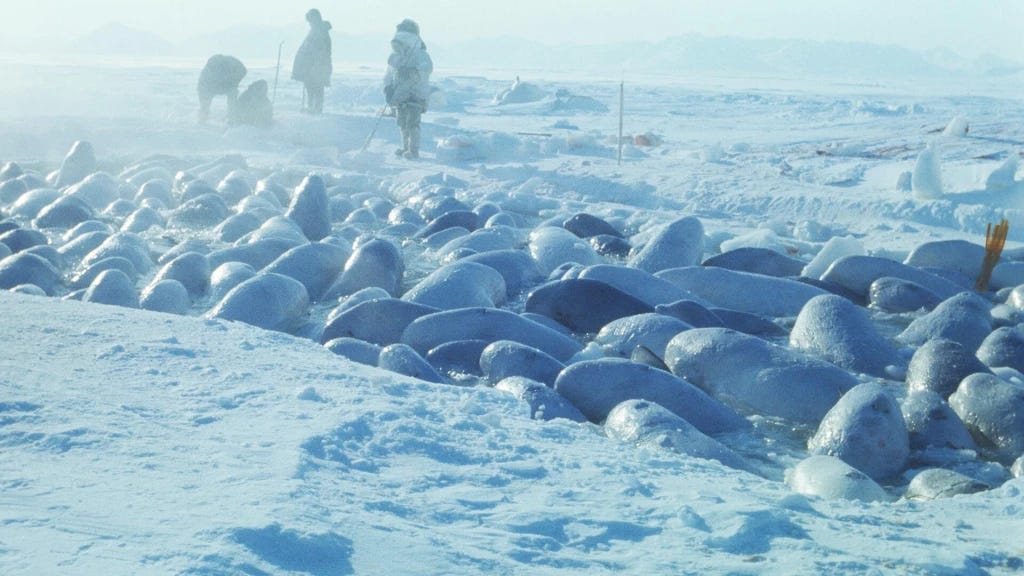Belugas are perfectly adapted for life in the Arctic. These white whales, known as the melonhead, the sea canary, Sisuaq by the Inupiat and Kooyedyee by the Tlingit, have evolved without a dorsal fin – instead sporting a ridge that helps them break through thin sea ice and more easily swim beneath it. They are deeply social creatures too, living, hunting and migrating in pods that can range from just a few individuals to hundreds, and sometimes thousands of them. Unfortunately, one such gathering occurred in 1984 when around 3,000 belugas found themselves in a desperate situation and in need of help from a Soviet icebreaker.
A hunter first spotted the pod in the ice-covered coastal waters of the Chukchi Sea – a marginal sea in the Arctic Ocean. The belugas had apparently chased a large shoal of cod into the Senyavin Strait but their pursuit would prove costly when a strong wind picked up and packed the narrow straight with ice. Too dense to break through and stretching too far for the belugas to navigate in a single breath, they were trapped.
The pod found themselves cornered in an ever-shrinking breathing hole, each taking turns to surface for air. When locals heard about the whales' plight, they rushed to help, digging to enlarge the breathing holes and even feeding them frozen fish. But as temperatures continued to drop and dozens of whales began to perish, it became clear that more drastic intervention was needed.
And several weeks later, more drastic intervention arrived in the shape of the Moskva – at the time, the largest and most powerful non-nuclear icebreaker ever built. At 122 metres long and weighing over 13,000 tonnes, this formidable vessel had spent decades escorting ships along the North Sea trade route. Now, she faced a different challenge entirely.
Upon reaching the site, the Moskva's captain initially called off the mission as the ice was simply too thick. But as more whales began to perish, the crew made one final attempt, loading a full tank of fuel and ploughing through. While the ship worked to forge a channel, helicopters dropped fresh fish near the breathing holes to keep the desperate pod alive. After several days of breaking through the ice, the Moskva finally reached the whales but weak and frightened of the enormous propellers, the belugas refused to follow the ship back out of the narrow channel.
That's when a crew member suggested using sound to guide the whales. Marine mammals are known to be highly responsive to acoustic signals, and so the Moskva began broadcasting various types of music through the ship's speakers. Through trial and error, they discovered the belugas responded most strongly to classical compositions – Tchaikovsky was their preferred Russian composer – and eventually they became more confident in approaching the ship.
Captain Kovalenko explained his method when he reported back to headquarters: "We back up, then advance again into the ice, make a passage, and wait. We repeat this several times. The belugas start to 'understand' our intentions and follow the icebreaker. Thus we move kilometre by kilometre." The operation continued for weeks as the Moskva slowly carved a 15-mile path and by the end of February 1985, an estimated 2,000 belugas had successfully navigated the channel to open water.
Operation Beluga is a reminder of the remarkable ways humans and animals can learn to communicate when they need to. There’s also something to be said for the power of music in bridging gaps and building trust.
Video by Tony Cheng.
Here at Beached we are building a community that can put our brains and resources together to highlight and fund solutions to the problems facing beluga whales and the oceans they live in. I hope you’ll join our humble community and click subscribe for free or support our work by purchasing the paid subscription.
All Beached posts are free to read but if you can we ask you to support our work through a paid subscription. These directly support the work of Beached and allow us to engage in more conversations with experts in the field of marine conservation and spend more time researching a wider breadth of topics for the newsletters. Paid subscriptions allow us to dedicate more time and effort to creating a community and provide the space for stakeholders to come together, stay abreast of each other’s work and foster improved collaboration and coordination.
One day Beached hope to donate a large percentage of the revenue from paid subscriptions to marine conservation organisations and charities to support their work too. Working together, we can reverse the degradation of our oceans.
Amie 🐋




A beautiful story and event I wasn’t aware of but will now stay with me. So much so, I listened to Tchaikovsky during a nature walk today🍂
Amie, wonderful story and the video is just amazing. The sound didn't work for me, so I just hummed "Baby Beluga" and let it fill me up. Thank you for this treat.